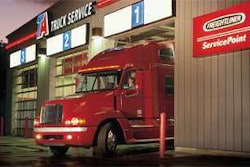Increasingly, fleets are using more virtual means to manage their assets. Rather than maintaining and supporting their own IT infrastructure, more companies are choosing the cloud-based model for computing. They are accessing their software systems remotely through an internet connection. The Web browser is their front end to many, if not all, of the applications they use to run their businesses.
This cloud strategy paid off for Charlie Blanchard when Hurricane Sandy hit his business during the first week of November. Blanchard is president of Blanchard Transportation Services of Stamford, Conn., an LTL and truckload freight carrier.
At first look, the situation was bleak. Tractors and trailers were damaged, he says. A great many deliveries and pickups in New Jersey,Connecticut, and New York could not be made because of building and road closures.
“There was one thing that worked very well for us, and that is our IT system,” says Blanchard. “Our system is set up to operate reliably since it is web-hosted using cloud computing, not hosted on a single server.”
“We had to close our main office due to power loss, but that did not matter,” he continued. “Our web-hosted system operates independently of our offices and kept running throughout the big blow. So we were able to keep our trucks running in Rhode Island, Massachusetts, Vermont, and everywhere else we could go as the storm raged.”
Bob D. Kortenhaus, who manages the trucking side of the business for Bilkays Express Co., with terminals in Elizabeth and Linden, N.J., faced a similar situation when Sandy hit. After losing power, Internet, and phone service at the company’s headquarters, he was relieved to learn that the his web-hosted cloud-based system was still accessing EDI (electronic data interchange) and transmitting information to drivers via their hand-held devices, assuring continuity in Bilkays’ operations. His drivers, too, kept rolling wherever storm conditions allowed them to do so.
“We serve the docks and haul containers throughout the tri-state area, handling LTL, warehousing, and breakbulk operations and forwarding truckload trailers into the city and environs,” says Kortenhaus. “It was enough of a disruption when the entire port closed down. At least we were able to keep our trucks moving whenever we could make a pick-up or a delivery.”
“When the ports reopened after the earlier shutdown was a critical time for us,” he continued. “Suddenly, containers could be taken off ships. Soon, these were stacked up alongside containers that had been taken off ships earlier but were not picked up due to the storm shutdown. Add to that the traffic congestion caused by trucks lining up to pick up the backlogged containers, and we needed all the communications we could get to move the loads. But since our system was never down, we sorted it out quickly.”
Both companies use a web-hosted, cloud-based version of the Facts total freight management system from Carrier Logistics Inc. (CLI) of Tarrytown, N.Y. The system is hosted by OpSource, a tier-one web delivery application platform, on multiple servers across the U.S., so there is no chance of losing the system no matter how severe a storm, the company says.











